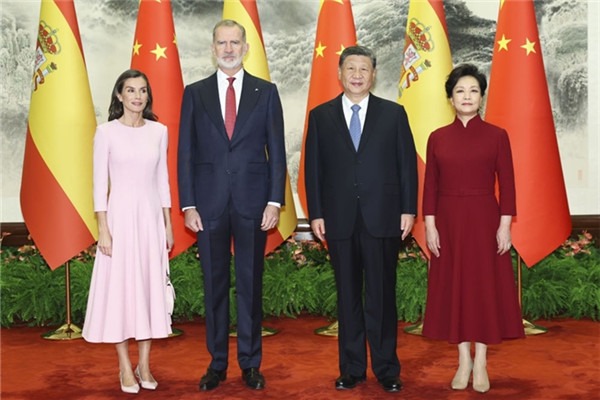Xinjiang attracts young entrepreneurs with economic incentives


China's Xinjiang Uygur autonomous region is increasingly attracting young entrepreneurs, who are drawn by its favorable economic landscape, industrial priorities and policy incentives.
Members of the China Youth Entrepreneurs Association have invested more than 23 billion yuan ($3.23 billion) in Xinjiang in recent years, with planned projects set to bring in an additional 40 billion yuan, according to the association. These investments target key sectors such as new energy, mining, intelligent manufacturing, modern agriculture, ecological management and intelligent computing.
Xinjiang, which boasts abundant agricultural, energy and mineral resources, is positioning itself as a strategic economic hub. Backed by 19 ports and continuously improving infrastructure, the region aims to build a "golden channel" across the Eurasian continent and a gateway for opening-up to the West.
Earlier reports from Xinjiang Daily revealed the region planned to launch 500 key projects this year alone, with a total investment of 3.47 trillion yuan. Additionally, some 40 central State-owned enterprises are set to complete key project investments totaling more than 380 billion yuan in Xinjiang this year.
These projects are focused on upgrading infrastructure — including integrated transportation, water resource utilization, power grids, oil and gas pipelines, and intelligent computing — while also supporting industrial clusters in areas such as oil and gas storage and production, clean coal utilization and new power systems. Other initiatives aim to enhance public services in education, cultural tourism, health and sports.
The nation's strategic focus and growing investment in Xinjiang are creating new trade and business opportunities, boosting confidence among entrepreneurs.
Yan Linlong, general manager of Xinjiang Hahon Industrial Investment Co, noted that Xinjiang has entered a period of historic opportunity and is set to play a bigger role in China's "dual circulation "development strategy. This strategy takes the domestic market as the mainstay while allowing domestic and international markets to reinforce each other.
"As a core area of the Silk Road Economic Belt, Xinjiang is cultivating a more open business environment and strengthening transportation links with Central Asia and Eastern Europe," Yan said. His company provides cold chain warehousing and logistics services across all 14 prefecture-level regions in Xinjiang and is now looking westward to explore market potential overseas.
Another investor, Qiankun Environmental Protection Co based in Xinxiang, Henan province, has implemented multiple wastewater and exhaust gas treatment projects across the region since 2009, with total investments reaching 300 million yuan. The company plans to invest another 500 million yuan in three upcoming projects, including one aimed at exporting environmental protection equipment and services to Central Asia.
Pan Jianwen, chairman of Qiankun Environmental Protection, said the company's strengths align with Xinjiang's pressing need for green transformation. He also highlighted the export potential unlocked by the region's opening-up policies, pragmatic government services, and the establishment of the China (Xinjiang) Pilot Free Trade Zone in 2023.
Both Yan and Pan were among some 120 young entrepreneurs who visited Xinjiang's Kashgar prefecture on Friday and Saturday. The delegation included representatives from provinces and municipalities participating in paired assistance programs with Xinjiang such as Guangdong, Shandong, Jiangsu and Zhejiang provinces, as well as Shanghai and Chongqing.
Their businesses cover areas including smart agriculture, intelligent manufacturing, petrochemicals, new energy, the digital economy and cultural tourism. The trip, organized by the China Youth Entrepreneurs Association and the Xinjiang regional committee of the Communist Youth League of China, featured investment promotion sessions and discussions focused on Kashgar's cultural tourism, modern agriculture and the Kashi (Kashgar) Economic Development Zone.
With five land and air ports and proximity to countries such as Pakistan, Tajikistan and Kyrgyzstan, Kashgar serves as a strategic corridor to Central Asia, West Asia and South Asia, offering strong economic complementarity with neighboring markets.
Lin Haibo, director of the youth development department of the Xinjiang regional committee of the Communist Youth League of China, said the visit aimed to build a platform for cooperation and encourage young entrepreneurs to participate in Xinjiang's modernization.
The Kashgar trip was the third in a series hosted by the two institutions since December, following earlier stops in Urumqi and the Ili Kazak autonomous prefecture. To date, 10 companies have confirmed investment plans in Xinjiang. Among them are three flagship projects in Ili focusing on new materials, intelligent equipment and new energy, with a combined investment of 1 billion yuan. These projects are expected to directly create 750 jobs.
Contact the writers at fangaiqing@chinadaily.com.cn





































